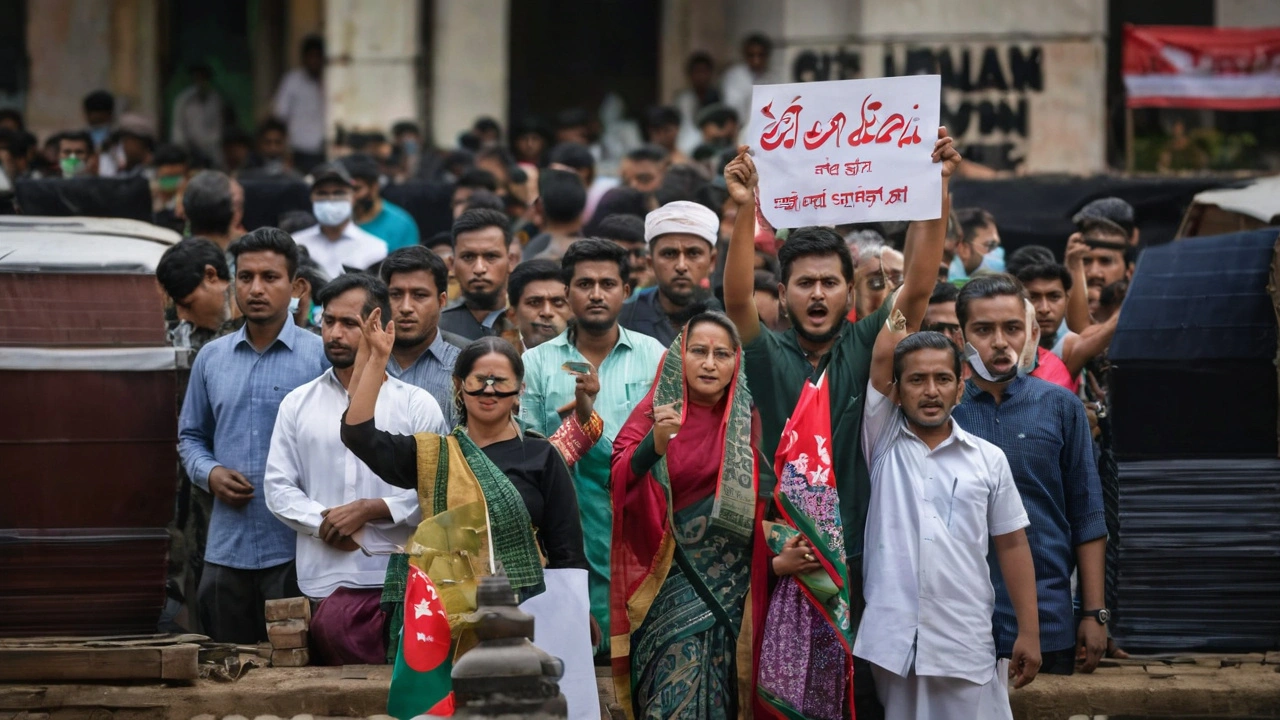
Sheikh Hasina's Resignation Shakes Bangladesh
In a move that has sent shockwaves across Bangladesh and the international community, Prime Minister Sheikh Hasina has resigned from her position. This unexpected development follows a series of violent protests ignited by a polarizing quota reform movement. The sudden resignation is a significant political shift for the country, bringing into question the future governance of Bangladesh.
The Spark: Quota Reform Movement
The roots of this crisis lie in the controversial quota reform movement. The movement aimed to change how government jobs were allocated, focusing on ethnic and socioeconomic criteria. Initially, it was a peaceful demand for equitable reform. However, as negotiations with the government dragged on without fruitful outcomes, frustrations grew among the movement’s supporters. The tension reached a boiling point, transforming peaceful protests into violent confrontations.
Protesters clashed with law enforcement, leading to scenes of chaos and destruction. Historical landmarks were not spared, and inflammatory rhetoric only fanned the flames. The once peaceful protests escalated dramatically, resulting in over 30 deaths.
Government's Response
The government, in response to the escalating violence, implemented a stringent curfew to re-establish order. Military personnel were deployed onto the streets, a rare sight in Bangladesh's recent history. This response showcased the government's alarm at the unraveling situation. Yet, critics argue that this show of force did little to address the underlying discontent among the population.
Violence Peaks with TV Headquarters Assault
One of the most shocking episodes of the unrest was the attack on the state TV headquarters. Protesters forcefully overtook the building, setting it on fire as a symbolic act of rebellion against what they perceived as biased media coverage. The images of the burning building became emblematic of the broader turmoil gripping the nation.
The Political Fallout
In the wake of such unrest, skepticism about the government's ability to control the situation intensified. Eventually, this pressure culminated in Prime Minister Sheikh Hasina’s resignation. This departure marks the end of an era in Bangladeshi politics. Sheikh Hasina has been a dominant figure in the country's political landscape for decades, and her sudden exit leaves a vacuum during a critical moment.
What's Next for Bangladesh?
The resignation opens up a Pandora’s box of questions regarding Bangladesh's future. Who will step in to fill the leadership void? Will the new leadership address the root causes of the unrest? There's speculation about potential candidates and whether they can unite a fractured nation. Political analysts emphasize the need for whoever takes the helm to prioritize democratic reforms and address public grievances diligently.
International Reactions
The international community is keenly watching the unfolding events in Bangladesh. Statements from foreign governments and organizations urge for calm and a return to stability through democratic means. Human rights groups have called for investigations into the violence and accountability for those responsible. The global attention underscores Bangladesh’s relevance on the world stage and the ripple effects this crisis could have regionally.
Long-Term Implications
In the long-term, the quota reform movement and the subsequent political upheaval may drive profound changes in Bangladesh's governmental structures. There is a golden opportunity for comprehensive reforms that could modernize and stabilize the nation's governance systems. Yet, this is contingent on the political will and leadership to seize the moment.
The social fabric of Bangladesh also faces significant strain. The deaths and destruction have left a mark on the collective consciousness. Healing and rebuilding will require concerted efforts not just from the government, but from civic leaders, religious figures, and the broader civil society.
Current Situation and Future Prospects
For now, the immediate future remains uncertain. The interim leadership must navigate a minefield of challenges, including placating a weary and disillusioned populace while warding off further unrest. There is a palpable sense of anticipation across the nation, with many hoping for a swift resolution and a fresh path forward.
In this tense atmosphere, the next few weeks and months will be critical. If managed well, this crisis could be a turning point for Bangladesh, catalyzing positive change and reform. Conversely, missteps could lead to greater instability and prolong the nation's woes.
As the world watches, Bangladesh stands at a crossroads. The crisis stemming from the quota reform movement and Sheikh Hasina's resignation could redefine the nation’s trajectory. The hope is for a peaceful, democratic resolution that addresses the root causes of unrest and sets Bangladesh on a course for a brighter, more stable future.




